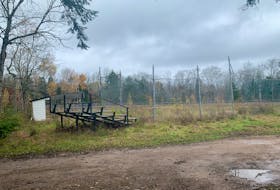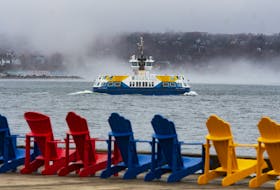Last summer, Kirby Mercer said he and his partners needed an offtake agreement by the end of 2017 or key investors might lose interest in his offshore wind energy project.
Two months into 2018, there is no such agreement with government, the utilities and potential customers for the power generated, but Mercer says things are still moving forward with the development.
Related stories:
All is quiet in progress of Beothuk Energy’s wind project plans for western Newfoundland
Western Newfoundland mayors want province to support developing wind power industry
Beothuk Energy says it is ready to spend $1 billion to create new wind farm industry
Mercer is chairperson and chief executive officer of Beothuk Energy Inc., but is also chairperson of the joint venture Atlantic Canada Offshore Developers. That entity is a partnership between Beothuk and Copenhagen Infrastructure Partners, the main financial backers of Mercer’s idea.
“Obviously, we’re still here,” Mercer said about the impact of a lack of an offtake agreement during an interview this week.
Mercer still hopes to base a gravity-based structure fabrication plant and wind farm in western Newfoundland. He has said he has secured $1 billion to invest and the project could possibly generate around 2,000 jobs.
There is no guarantee yet, though, that the work won’t go elsewhere in Atlantic Canada. Mercer and his joint-venture partners are in negotiations with the Newfoundland and Labrador government, but are also discussing the project with New Brunswick and Nova Scotia.
He would not go into detail about any of those talks, but said progress is being made.
He did note that Atlantic Canada Offshore Developers just went through a request for proposals process for the design and building of the gravity-based structures.
“We are doing a lot of work that you don’t necessarily see physical things (from), but it is all planning for the future,” he said.
He and his partners remain confident they will get a deal somewhere in Atlantic Canada. He said there is a lot of activity and growth in the industry in the Northeastern United States and feels Atlantic Canada Offshore Developers can play a role in expanding the industry into Atlantic Canada.
“Without getting into the business model, we have identified markets for our power, whether it’s being developed here in the province or in New Brunswick or Nova Scotia,” he said. “There is a way we can produce power in this province and sell to other markets. There are other people who may tell you the contrary, but we know there is a way.”
Basing the operations out of western Newfoundland remains Mercer’s preference. If the venture’s first project winds up elsewhere in Atlantic Canada, he said it will be hard to maintain spinoffs for the west coast of the island.
“I would say there will be a strong lobby from that (other) province to have most of the benefits realized within their jurisdiction,” he said.
Mercer said the Newfoundland and Labrador government has been open with him and his partners in trying to find a way to make the project happen. He acknowledged the unexpected skyrocketing costs of the controversial Muskrat Falls hydroelectricity megaproject in Labrador is an issue for developing wind power, but insisted it doesn’t doom the wind project.
“A lot of the power we’ll be producing won’t be sold within the province,” he said. “Some of it may be, but the majority of it will be exported.
“Our project will help put more revenues back in the provincial purse.”
According to Mercer, the Conference Board of Canada just did a study for Atlantic Canada Offshore Developers on the socioeconomic benefits of this sector.
He said the think tank’s findings are being presented to certain groups privately and he wasn’t sure when the report might be available publicly.
“They are tremendous for Atlantic Canada and Newfoundland (and Labrador),” Mercer said of the benefits reported in the document.
The Western Star asked for an interview with the province’s Natural Resources Minister Siobhan Coady. No interview was arranged Thursday, but a prepared statement from the department stated, as it has on previous occasions, that the provincial government is awaiting the partnership to compete its discussions with potential customers before entering into further discussions to take any proposal to its next level.









